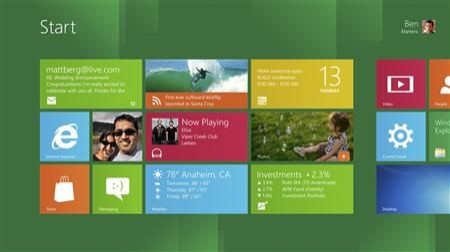Five Reasons Why it’s Too Late for Windows 8 to Challenge Android’s Dominance

The smartphone and tablet market is mostly dominated by Android and Apple's iOS, but Microsoft is trying to break in with its Windows-powered tabs.
Windows 8 is focused on tablets as Microsoft looks to gain a foothold in the sector. But for now, it is safe to say that Apple has an unchallenged hold on the tablet market and the claim of being the best tablet maker and manufacturer, as the iPad has yet to find a credible competitor.
Windows has dominated operating systems for decades, but does it have enough firepower to challenge Android in the Smartphone and Tablet sector?
Here is a list of the five reasons why Microsoft may falter against Android.
Both Android and iOS, unlike Microsoft’s Windows 8, are app-centric. Apple currently boasts more than 500,000+ apps, with nearly 90,000 specifically dedicated to the iPad. Even Android has nearly 500,000+ estimated apps, although official figures show about 250,000+. The Windows Marketplace, on the other hand, has only 9,000+ apps and it will take time to catch up with the big boys.
The drawback that Windows 8, meant for the mobile platform, faces is that the operating system has not been designed to be app-centric, but to distribute information resourcefully. Windows has to work on this area if it stands any chance against the dominance of Android.
Android is an open-source platform. This is one area where even iOS is looking to establish its hold and Microsoft is not known to openness. Both Microsoft’s Windows Phone 7 and Apple’s approach to openness are more similar to each other than to Google’s approach to android.
Android’s openness lets manufacturers and wireless providers customize it in any way they wish. Android OS has always been, from the start, designed specifically so that it can be tweaked in any way the user wants. This open source, in turn, provides flexibility that has always been one of Android’s biggest strengths. Ranging from simple desktop wallpaper to the notification tones to the LED indicator light, Android has always been easy to personalize.
Android has its own built-in set of keyboard shortcuts, but you still have the option to create your own. The Android widgets also come in all shapes and sizes that are either pre-loaded in the smartphone or can be downloaded from the Android Market. Windows 8, however, does not allow the same.
Microsoft, playing catch-up, is trying to tie up with different mobile hardware makers to run its Windows Phone 7 OS on a variety of devices. Android, meanwhile, is already on its way to most smartphones in the world, offered by companies like Samsung, HTC, Dell, Motorola, Lenovo and Sony Ericsson. But Android's hold is not limited to smartphones and tablets. It has also reached E-readers and is expected to come along with Amazon’s upcoming Kindle tablet.
Windows Phone 7, however, is only found in a few smartphones manufactured by Dell, HTC, Acer and LG. Windows 8 will take some time to become compatible with other mobile devices.
Android, unlike the Windows Phone 7, provides a host of Google features such as Gmail, Google Calendar and Google Documents. Even iOS is centered on MobileMe and iTunes. The Android devices, currently, have made a huge impact on the mobile industry.
Android offers a variety of capabilities that others fail to deliver or don’t have. The capabilities include Near Field Communication support and tethering via USB, Wi-Fi or Bluetooth, so you can use it to share your Internet connection with other devices, such as a tablet, a smartphone or a laptop. Other features include built-in voice search and voice control features that enable you to initiate phone calls, surf the Web, compose text messages and send mails by voice command rather than physically using the device.
Microsoft, meanwhile, is more focused on services and tools, and Windows 8 is only centered on Microsoft’s apps and other cloud-based services. The Windows mobile OS is also devoid of a universal in-box, unlike iOS and Android, where all the e-mail messages from multiple services are shown in a single location.
The operating system itself could also take some beating from the Android platform. Windows 8, when released, will be a comparatively new platform that will combine several features of Windows Phone 7, Windows 7 and XP.
Windows 8, at the moment, features a new start screen similar to the one in Windows Phone 7 which has live application tiles. This replaces the Start menu and is shown on the startup. Microsoft, rather than creating a new operating system for its tablet, is planning to use an update to the traditional Windows PC operating system, which may not be such a good idea.
Android users, however, are using a better and a faster OS when on mobile devices. Users are currently enjoying larger applications similar to what they started to enjoy with the introduction of SMS and MMS back in the 1990s.
Must Read: Windows 8 With 300 Plus Features Listed
© Copyright IBTimes 2024. All rights reserved.





















